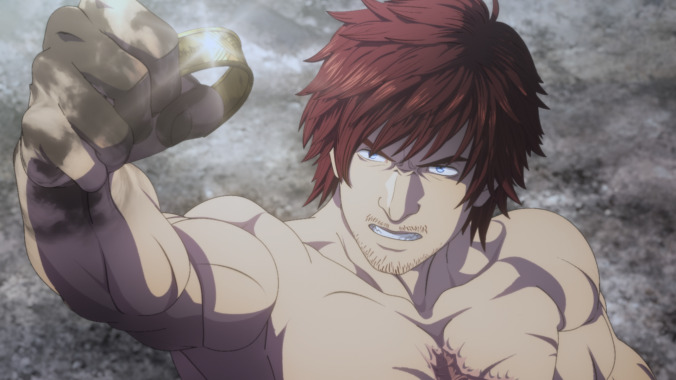Dragon’s Dogma is a fun, if forgettable, video game adaptation from Netflix

Adapting a video game into some other medium is often a tough sell, for reasons that are generally obvious. Video games are basically about giving you some control over what happens in a story (even if the story is “Pac-Man runs away from ghosts”), and that’s always going to be lost when you turn one into a movie, or a theme park, or—to pick out a totally random third option—a seven-episode Netflix anime series. The other side of that coin, though, is that moving a video game into a different medium gives its non-interactive parts a chance to stand in the spotlight for a moment, which Netflix has already done on its occasionally great Castlevania show. Dragon’s Dogma, the streamer’s latest video game adaptation, isn’t quite as intermittently enjoyable as Castlevania, but it does suggest that the idea of turning a video game into something else isn’t always a terrible idea.
This is somewhat surprising for Dragon’s Dogma, since—unlike Castlevania, which has decades of lore to pull from—its most memorable qualities as a video game were decidedly video game-y. As we explained when Netflix released a trailer for Dragon’s Dogma, the core appeals of the game were making your own medieval fantasy hero, creating a sidekick character called a Pawn that you could share with your friends online to help them in their adventures, and then killing fantasy monsters by climbing on them and stabbing their weak points. A TV show can’t do a lot of that, and it’s not really fair to judge it for forcing a protagonist on you that you didn’t create, so it’s a good thing that Dragon’s Dogma actually has a fairly interesting story to tell (and a fair amount of climbing).
The hero that Netflix creates for the viewer is a fairly generic fantasy protagonist named Ethan. He lives in a village that’s so peaceful, the soldiers guarding its borders spend all day getting drunk. Ethan mentors a young kid who seems to really look up to him, and his perfect wife is about to give birth to their first child. If you’ve ever heard any story ever, even if you don’t know the game, you should know how this goes: By the end of the first episode, a dragon —the first seen in a century!—has attacked and slaughtered everyone in the town, leaving Ethan (who had to watch his young friend get swallowed and his wife get roasted) as the sole survivor. Except he doesn’t survive. The dragon takes a moment to taunt Ethan, purposefully enraging him, and then goads Ethan into a quest for revenge before ripping out Ethan’s heart (yes, it’s a metaphor).
This turns Ethan into an Arisen, which is never really explained in the show but mostly means he’s now an adventuring hero with no heart, and he gets paired up with a Pawn (an immortal sidekick with no emotions or personality of their own). Ethan and his Pawn, who he names Hannah, head off on a quest to find the dragon, but then Dragon’s Dogma establishes a clever structural design created just for the show. Each episode is named after one of the seven deadly sins, and the plot then involves someone in this once-idyllic-seeming fantasy world succumbing to that eponymous sin and either falling prey to a big monster or becoming a monster themselves.
It’s not just a gimmick, either, and sets up some nice-yet-predictable character development for both Ethan and Hannah. There’s also a twist that happens at the end of the game, so anyone who knows about that should know what to expect from the show, but Dragon’s Dogma foreshadows it nicely and then pays it off in a way that even people who guess what’s coming should be at least a little surprised.
The thing about the plot and storytelling, though, is that they’re more surprisingly good than they are legitimately good. The writing is often very ham-fisted, and in case you don’t guess the twist ahead of time, it is painstakingly explained once it starts to unfold. The voice acting is also a little rough, at least in English, with some of the side characters sounding suspiciously similar to… every other side character. This makes it a little hard to care about anyone other than the main duo, including some characters who appear in multiple episodes, so any time spent away from Ethan and Hannah feels somewhat like a waste of time (especially since their aforementioned development feels a little rushed in spots). There’s also a noticeable issue with female characters, who are all either nags or sex objects or sainted motherly figures, which is extremely hard to ignore in the stunningly misogynistic “Envy” episode. It would almost be worth skipping that one entirely if not for a pair of recurring characters who are introduced, as the episode throws in some tonally out-of-place sexual assault content and then ends with a sequence that is meant to be a horrifying shock but is really just distressingly gross—morally, aesthetically, narratively, whatever.
Despite the questionable choices made in “Envy,” Dragon’s Dogma is largely engaging while it unfolds, but doesn’t leave a lasting impact. The trick that it pulls with its larger story is neat, even if it’s practically telegraphed, but there’s not much else about the show that’s special or unique. Dragon’s Dogma works surprisingly well as something that’s not a video game, but it also worked better as a video game.